#more I need more
Explore tagged Tumblr posts
Text
I know Harwin Strong is dead...okay!!! but like I NEEEDDD more works!! I NEEED the HOTD writers to get to writing😭😭😭😭
please!!! I feel like I have read every single Harwin Strong fic out there!!

#harwin strong x reader#harwin strong#hotd#ser harwin#harwin breakbones#big daddy harwin breakbones#big daddy breakbones#i know harwin is dead but he is alive in my heart!!!#harwin strong fic#hotd harwin strong#more i need more#give me more#fic starved#hotd smut#harwin strong smut#harwin strong x reader smut#harwin strong x reader fluff#harwin strong fluff#harwin strong angst#harwin strong x reader angst
95 notes
·
View notes
Text
what am i supposed to do now that I’ve finished Fullmetal Alchemist Brotherhood
#in the post-tv show void#can’t stand endings but it was a good one#biggest surprise was the roy mustache#didn’t see that one coming#more I need more#I put off watching this show for years and in a few months it’s over??#can’t be right#wow#great show#my boys Ed and Al all grown up😭#such a great show#fullmetal alchemist#fullmetal alchimist brotherhood#fmab
70 notes
·
View notes
Text

say good morning to my wife or else (it’s 3 pm )
#my brain is so slushy#i don’t know what’s wrong w me#think i just need coffee#but i’m outside and it’s inside#my art#furry art#anthro art#furry#anthro#oc art#oc#doodlings#traditional art#more i need more#i f
62 notes
·
View notes
Text
I need to make more patches and sew my existing ones on my jacket
4 notes
·
View notes
Text
I require more. I need more silly and spooky stories. give me more websites with entire universes.
to clarify, I am aware of the following: SCP Wiki, Wanderers Library, Backrooms Wiki, and Liminal Archives.
3 notes
·
View notes
Text


me and gang at the haunted house
#i haven't seen the movie yet#i just thought this image was hilarious i needed to draw it with my tails design#i lovr that dumb gay and his genius fox buddy who is also dumb but he's 8 it's fine#harv's art#art#fanart#digital art#did this one on my phone with ibispaint x instead of my usual krita so#ibispaint x#sonic#sonic the hedgehog#sonic movie#sonic movie 3#agent stone#tails the fox#miles “tails” prower#safe fur work#sfw furry#sonic fanart#sonic fandom#how tf do i tag sonic art#furry/oc artist struggling to tag fanart#fork found in kitchen#i have more polished designs coming i promise guys im serious this time#love u gang#if u saw this already no u didnt i keep posting to the wrong blog
32K notes
·
View notes
Text

lazy mornings at the Last Drop ☕☀️
#arcane#silco#vander#jinx#arcane powder#zaundads#mylo and claggor#timebomb#arcane s2e7#arcane silco#arcane vander#arcane mylo#arcane claggor#does that AU have a name??#anyways i need more domestic things from them#erio art#erio stuff
35K notes
·
View notes
Text
I want to step away from the art-vs-artist side of the Gaiman issue for a bit, and talk about, well, the rest of it. Because those emotions you're feeling would be the same without the art; the art just adds another layer.
Source: I worked with a guy who turned out to be heavily involved in an international, multi-state sex-slavery/trafficking ring.
He was really nice.
Yeah.
It hits like a dumptruck of shit. You don't feel stable in your world anymore. How could someone you interacted with, liked, also be a truly horrible person? How could your judgement be that bad? How can real people, not stylized cartoon bogeymen, be actually doing this shit?
You have to sit with the fact that you couldn't, or probably couldn't, have known. You should have no guilt as part of this horror — but guilt is almost certainly part of that mess you're feeling, because our brains do this associative thing, and somehow "I liked [the version of] the guy [that I knew]", or his creations, becomes "I made a horrible mistake and should feel guilty."
You didn't, loves, you didn't.
We're human, and we can only go by the information we have. And the information we have is only the smallest glimpse into someone else's life.
I didn't work closely with the guy I knew at work, but we chatted. He wasn't just nice; he was one of the only people outside my tiny department who seemed genuinely nice in a workplace that was rapidly becoming incredibly toxic. He loaned me a bike trainer. Occasionally he'd see me at the bus stop and give me a lift home.
Yup. I was a young woman in my twenties and rode in this guy's car. More than once.
When I tell this story that part usually makes people gasp. "You must feel so scared about what could have happened to you!" "You're so lucky nothing happened!"
No, that's not how it worked. I was never in danger. This guy targeted Korean women with little-to-no English who were coerced and powerless. A white, fluent, US citizen coworker wasn't a potential victim. I got to be a person, not prey.
Y'know that little warning bell that goes off, when you're around someone who might be a danger to you? That animal sense that says "Something is off here, watch out"?
Yeah, that doesn't ping if the preferred prey isn't around.
That's what rattled me the most about this. I liked to think of myself as willing to stand up for people with less power than me. I worked with Japanese exchange students in college and put myself bodily between them and creeps, and I sure as hell got that little alarm when some asian-schoolgirl fetishist schmoozed on them. But we were all there.
I had to learn that the alarm won't go off when the hunter isn't hunting. That it's not the solid indicator I might've thought it was. That sometimes this is what the privilege of not being prey does; it completely masks your ability to detect the horrors that are going on.
A lot of people point out that 'people like that' have amazing charisma and ability to lie and manipulate, and that's true. Anyone who's gotten away with this shit for decades is going to be way smoother than the pathetic little hangers-on I dealt with in university. But it's not just that. I seriously, deeply believe that he saw me as a person, and he did not extend personhood to his victims. We didn't have a fake coworker relationship. We had a real one. And just like I don't know the ins-and-outs of most of my coworkers lives, I had no idea that what he did on his down time was perpetrate horrors.
I know this is getting off the topic, but it's so very important. Especially as a message to cis guys: please understand that you won't recognize a creep the way you might think you will. If you're not the preferred prey, the hind-brain alarm won't go off. You have to listen to victims, not your gut feeling that the person seems perfectly nice and normal. It doesn't mean there's never a false accusation, but face the fact that it's usually real, and you don't have enough information to say otherwise.
So, yeah. It fucking sucks. Writing about this twists my insides into tense knots, and it was almost a decade ago. I was never in danger. No one I knew was hurt!
Just countless, powerless women, horrifically abused by someone who was nice to me.
You don't trust your own judgement quite the same way, after. And as utterly shitty as it is, as twisted up and unstead-in-the-world as I felt the day I found out — I don't actually think that's a bad thing.
I think we all need to question our own judgement. It makes us better people.
I don't see villains around every corner just because I knew one, once. But I do own the fact that I can't know, really know, about anyone except those closest to me. They have their own full lives. They'll go from the pinnacles of kindness to the depths of depravity — and I won't know.
It's not a failing. It's just being human. Something to remember before you slap labels on people, before you condemn them or idolize them. Think about how much you can't know, and how flawed our judgement always is.
Grieve for victims, and the feeling of betrayal. But maybe let yourself off the hook, and be a bit slower to skewer others on it.
#listen to old auntie Shades#serious#fuck I don't know how to tag this#I should probably read-more this but I'm not sure where#and now I need to go take a walk for my stupid mental health#you never stop processing#you do it over and over and over and over#and hope it gets a bit easier each time#Someone might get upset by using prey#but 'preferred prey' is an important concept from the predator's view#it doesn't mean the people are inherently prey#you feel me?#it's the best word I can find for the concept#neil gaiman#adjacent
25K notes
·
View notes
Text
more good news from tiktok: they’ve started blocking celebrities.
they’re calling it block party 2024. just blocking and ignoring countless celebrities who havent said shit about palestine. influencers, actors, anyone who went to the met gala, whatever, they’re getting blocked. and people keep talking about how cathartic it is, how good it feels, how they never realized they could DO that. there was some kind of subconscious law against blocking famous people, but it’s broken, and people are LOVING it. and it’s WORKING. a social media/digital advertising coordinator was talking about how ad companies are PANICKING, because they can’t accurately target anymore. so many big influencers, including fucking LIZZO started talking about palestine the MOMENT their follower counts started going down. and the best part? no one is forgiving them. lizzo posted a tiktok asking people to donate to palestinian families, and all the comments just said you’re a multimillionaire. put your money where your mouth is. blocked.
i feel like i’m witnessing the downfall of celebrity culture, right here right now. people are waking up.
#i’ve always blocked celebrities#but there’s something so beautiful about seeing someone discover that#so many people talking about how they joined the trend and then discovered hey. this feels good#i don’t need to pay attention to them! i’m going to block more! and i’m not unblocking them!!!#and it all started because someone at the met gala said let them eat cake#tiktok#block party#block party 2024
54K notes
·
View notes
Text
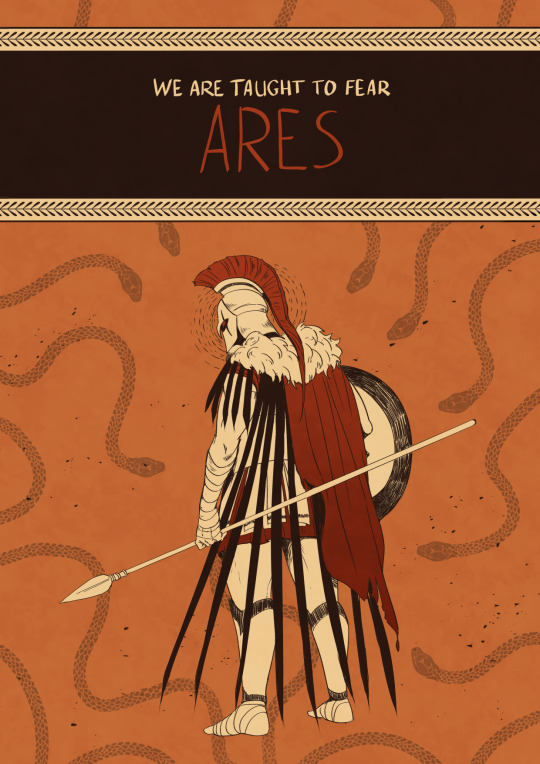
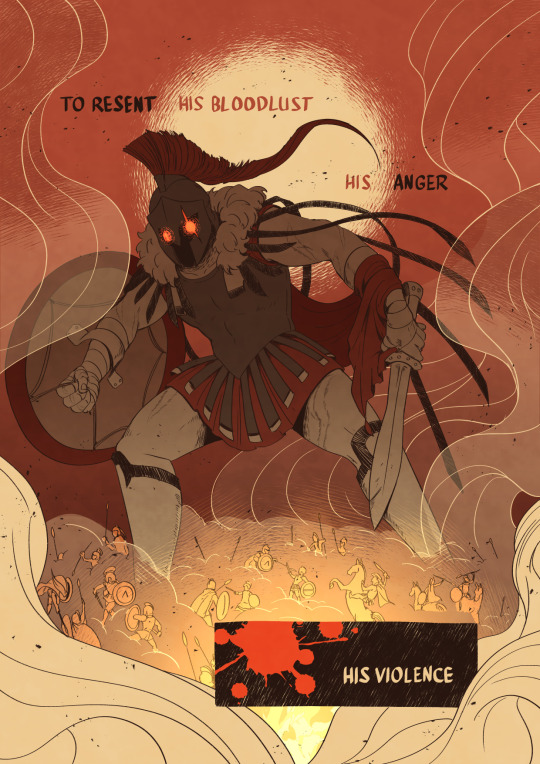
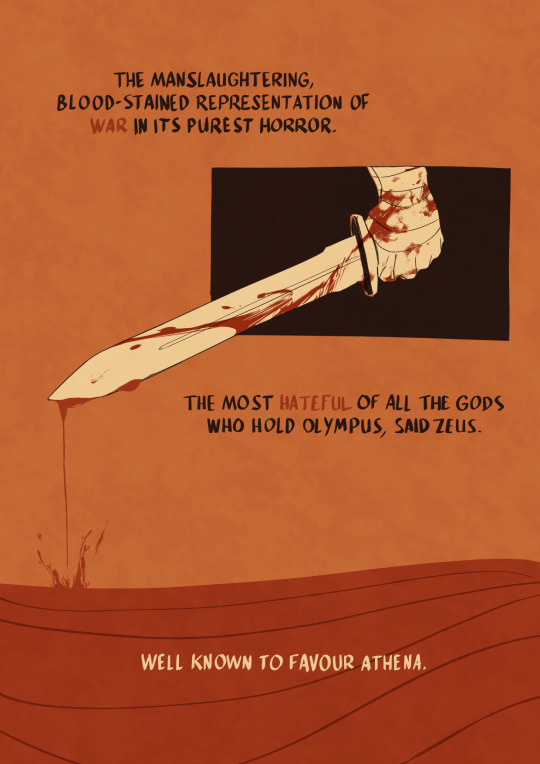
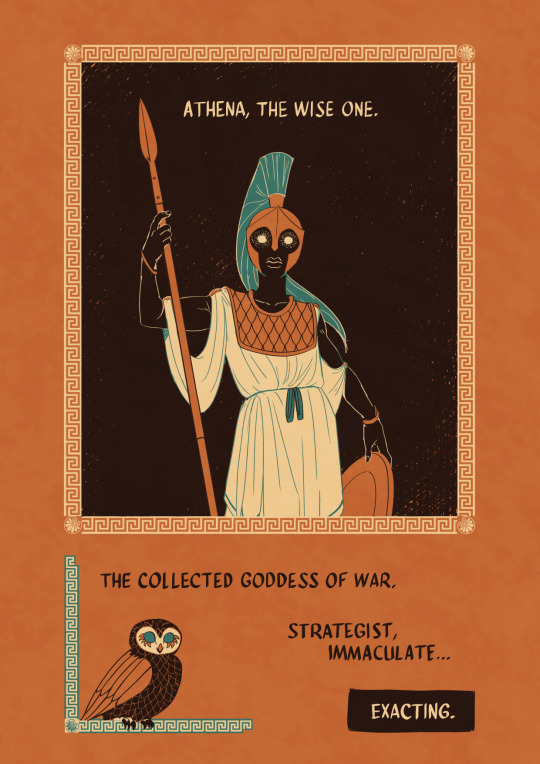
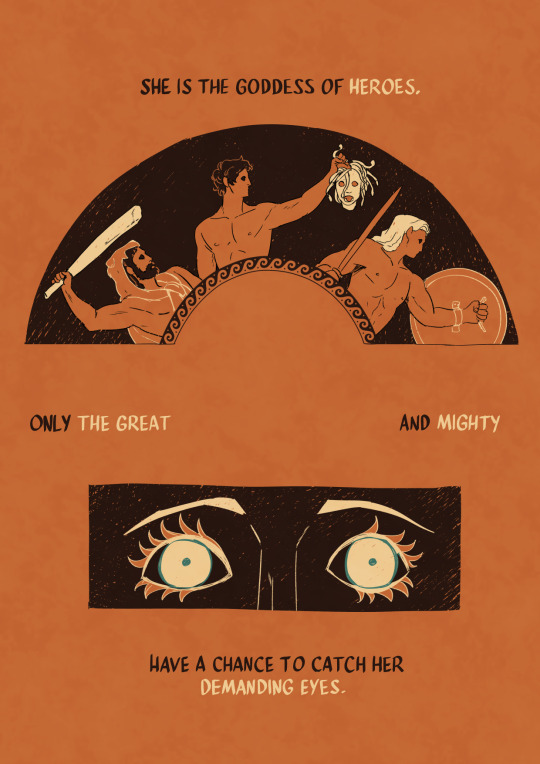
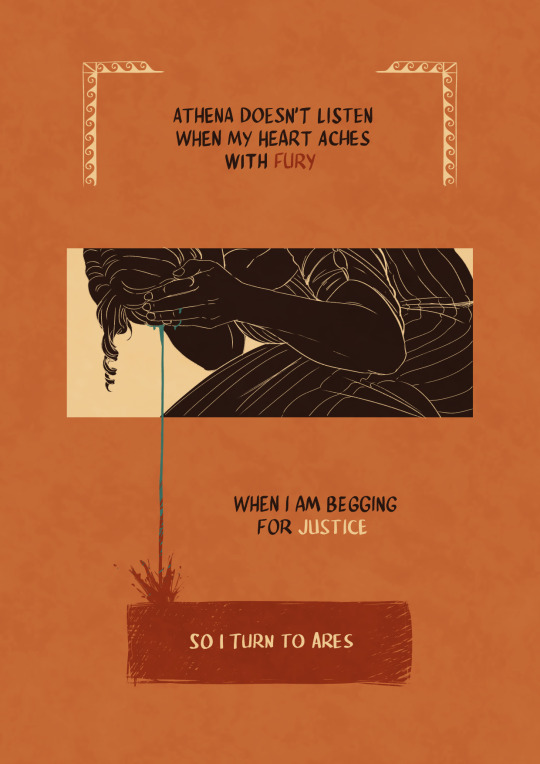
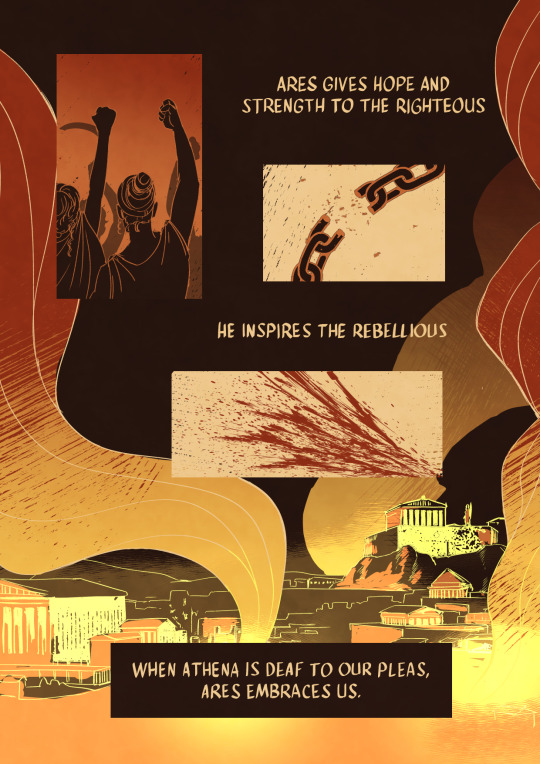
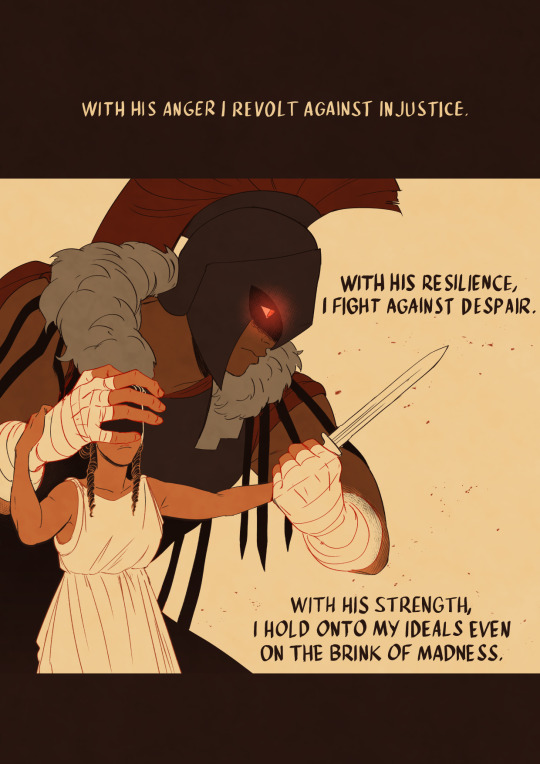
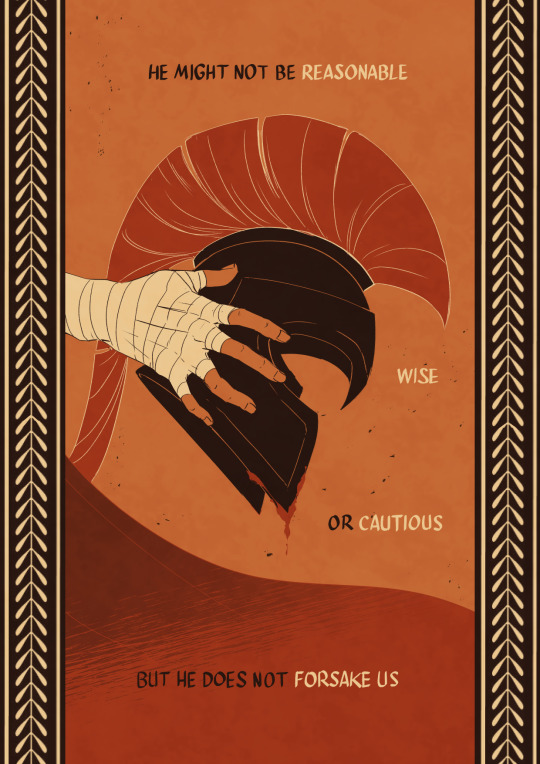
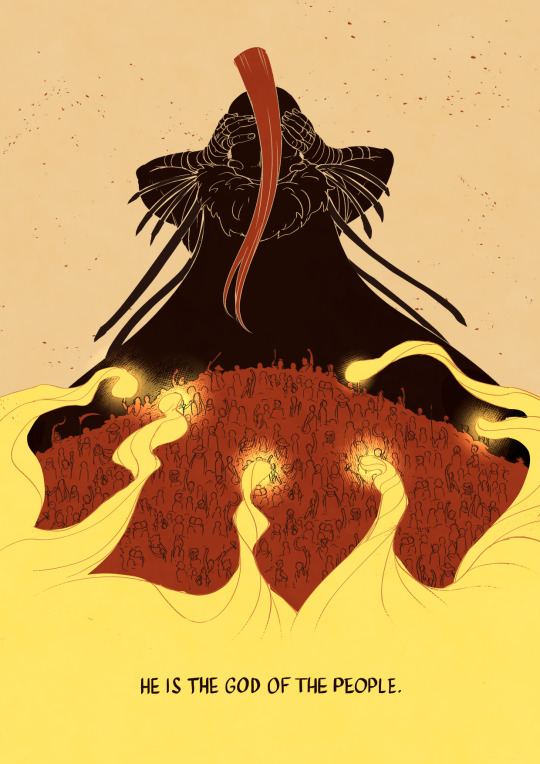
I turn to Ares.
Thanks to Tyler Miles Lockett who allowed me to draw inspiration from his ARES piece for page 2! Look at his etsy page it's SICK
⚔️ If you want to read some queer retelling of arturian legends have a look at my webtoon
#greek mythology#ares#athena#greek gods#dont get me wrong it aint athena slander but it sure is ares praise#on some level at least#man justly accused of bad things deserves some mid praise more at 11#thank you romi for helping me with words though i duly noted you insisted on ares not being cautious rather than him not being careful#romi be like “i want him to care” and honestly good you should say it#also EPIC led to this and i just..... i want to draw some animatics man i just need infinite time now#my long lost love for greek myths just will never stop coming and they dont stop coming and they dont stop coming#i want some vulture design in here for ares but not sure about this one#kochei doodles
99K notes
·
View notes
Text
since spotify wrapped is coming today i just want to bring awareness to the fact that around 86% of the songs on spotify are currently demonetized since spotify decided that tracks with under 1,000 cannot be monetized. not only that the ceo of spotify cashed out $35.8 million dollars in spotify shares in the third quarter of the year and it has been reported that he earns more than the top artists on the platform.
for a platform that claims to support artists, this is outrageous and i hope people realize that an artist who is starting out, cannot make a living out of spotify streams simply because daniel ek and his friends made it worse for the artists trying to start a career. if you wanna support musicians and the possibility for them to get a living wage please follow United Musicians and Allied Workers (UMAW) which are trying to make The Living Wage for Musicians Act a reality so musicians can be paid fairly through streaming platforms and get the cut they deserve.
#this is a daniel ek hate blog btw#i thought this was important#bc this isn't talked about enough#i found out about umaw this year#and truly we need unions for musicians#that fight for more rights and fair pay#spotify#spotify wrapped
21K notes
·
View notes
Text
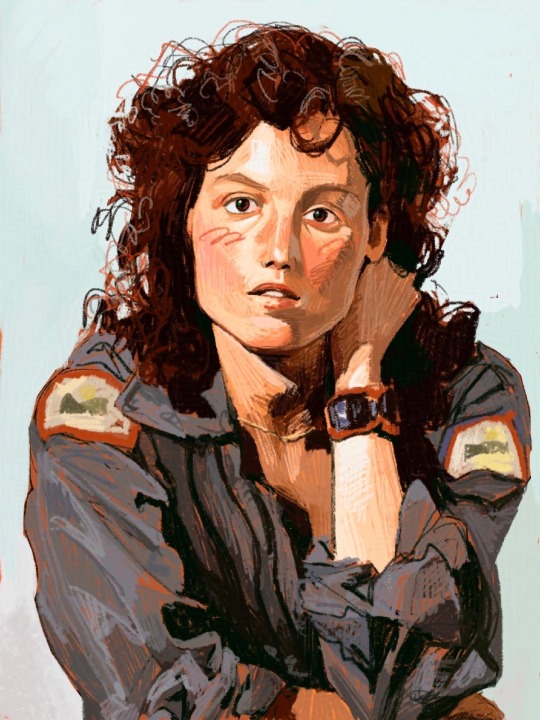
ripley :)
#alien franchise#alien 1979#my art#artists on tumblr#procreate#risky posting from my phone nowadays. what if i accidentally hit#one of my rash hive photos im taking for my dermatology appt 😭#anyways. watch this space for more ripley soon (in the form of pinup calendar)#just need to edit it and export it. but all tha pages are done!
27K notes
·
View notes
Text

the book of bill is great
#INSANE timeline we're living in tbh#alex really said hmmm bill's tumblr sexyman status is slipping i need to make him more PATHETIC and CRINGE and GAY#and he was right!#congrats to ford on the divorce 💖#gravity falls#the book of bill#the book of bill spoilers#billford#stanford pines#ford pines#bill cipher#alex hirsch
35K notes
·
View notes
Text

#artists on tumblr#nonbinary#transgender#nonbinary artist#nonbinary pride#trans pride#trans artist#i really need to post here more often
31K notes
·
View notes
Text
Planet's Fucked: What Can You Do To Help? (Long Post)
Since nobody is talking about the existential threat to the climate and the environment a second Trump term/Republican government control will cause, which to me supersedes literally every other issue, I wanted to just say my two cents, and some things you can do to help. I am a conservation biologist, whose field was hit substantially by the first Trump presidency. I study wild bees, birds, and plants.
In case anyone forgot what he did last time, he gagged scientists' ability to talk about climate change, he tried zeroing budgets for agencies like the NOAA, he attempted to gut protections in the Endangered Species Act (mainly by redefining 'take' in a way that would allow corporations to destroy habitat of imperiled species with no ramifications), he tried to do the same for the Migratory Bird Treaty Act (the law that offers official protection for native non-game birds), he sought to expand oil and coal extraction from federal protected lands, he shrunk the size of multiple national preserves, HE PULLED US OUT OF THE PARIS CLIMATE AGREEMENT, and more.
We are at a crucial tipping point in being able to slow the pace of climate change, where we decide what emissions scenario we will operate at, with existential consequences for both the environment and people. We are also in the middle of the Sixth Mass Extinction, with the rate of species extinctions far surpassing background rates due completely to human actions. What we do now will determine the fate of the environment for hundreds or thousands of years - from our ability to grow key food crops (goodbye corn belt! I hated you anyway but), to the pressure on coastal communities that will face the brunt of sea level rise and intensifying extreme weather events, to desertification, ocean acidification, wildfires, melting permafrost (yay, outbreaks of deadly frozen viruses!), and a breaking down of ecosystems and ecosystem services due to continued habitat loss and species declines, especially insect declines. The fact that the environment is clearly a low priority issue despite the very real existential threat to so many people, is beyond my ability to understand. I do partly blame the public education system for offering no mandatory environmental science curriculum or any at all in most places. What it means is that it will take the support of everyone who does care to make any amount of difference in this steeply uphill battle.
There are not enough environmental scientists to solve these issues, not if public support is not on our side and the majority of the general public is either uninformed or actively hostile towards climate science (or any conservation science).
So what can you, my fellow Americans, do to help mitigate and minimize the inevitable damage that lay ahead?
I'm not going to tell you to recycle more or take shorter showers. I'll be honest, that stuff is a drop in the bucket. What does matter on the individual level is restoring and protecting habitat, reducing threats to at-risk species, reducing pesticide use, improving agricultural practices, and pushing for policy changes. Restoring CONNECTIVITY to our landscape - corridors of contiguous habitat - will make all the difference for wildlife to be able to survive a changing climate and continued human population expansion.
**Caveat that I work in the northeast with pollinators and birds so I cannot provide specific organizations for some topics, including climate change focused NGOs. Scientists on tumblr who specialize in other fields, please add your own recommended resources. **
We need two things: FUNDING and MANPOWER.
You may surprised to find that an insane amount of conservation work is carried out by volunteers. We don't ever have the funds to pay most of the people who want to help. If you really really care, consider going into a conservation-related field as a career. It's rewarding, passionate work.
At the national level, please support:
The Nature Conservancy
Xerces Society for Invertebrate Conservation
Cornell Lab of Ornithology (including eBird)
National Audubon Society
Federal Duck Stamps (you don't need to be a hunter to buy one!)
These first four work to acquire and restore critical habitat, change environmental policy, and educate the public. There is almost certainly a Nature Conservancy-owned property within driving distance of you. Xerces plays a very large role in pollinator conservation, including sustainable agriculture, native bee monitoring programs, and the Bee City/Bee Campus USA programs. The Lab of O is one of the world's leaders in bird research and conservation. Audubon focuses on bird conservation. You can get annual memberships to these organizations and receive cool swag and/or a subscription to their publications which are well worth it. You can also volunteer your time; we need thousands of volunteers to do everything from conducting wildlife surveys, invasive species removal, providing outreach programming, managing habitat/clearing trails, planting trees, you name it. Federal Duck Stamps are the major revenue for wetland conservation; hunters need to buy them to hunt waterfowl but anyone can get them to collect!
THERE ARE DEFINITELY MORE, but these are a start.
Additionally, any federal or local organizations that seek to provide support and relief to those affected by hurricanes, sea level rise, any form of coastal climate change...
At the regional level:
These are a list of topics that affect major regions of the United States. Since I do not work in most of these areas I don't feel confident recommending specific organizations, but please seek resources relating to these as they are likely major conservation issues near you.
PRAIRIE CONSERVATION & PRAIRIE POTHOLE WETLANDS
DRYING OF THE COLORADO RIVER (good overview video linked)
PROTECTION OF ESTUARIES AND SALTMARSH, ESPECIALLY IN THE DELAWARE BAY AND LONG ISLAND (and mangroves further south, everglades etc; this includes restoring LIVING SHORELINES instead of concrete storm walls; also check out the likely-soon extinction of saltmarsh sparrows)
UNDAMMING MAJOR RIVERS (not just the Colorado; restoring salmon runs, restoring historic floodplains)
NATIVE POLLINATOR DECLINES (NOT honeybees. for fuck's sake. honeybees are non-native domesticated animals. don't you DARE get honeybee hives to 'save the bees')
WILDLIFE ALONG THE SOUTHERN BORDER (support the Mission Butterfly Center!)
INVASIVE PLANT AND ANIMAL SPECIES (this is everywhere but the specifics will differ regionally, dear lord please help Hawaii)
LOSS OF WETLANDS NATIONWIDE (some states have lost over 90% of their wetlands, I'm looking at you California, Ohio, Illinois)
INDUSTRIAL AGRICULTURE, esp in the CORN BELT and CALIFORNIA - this is an issue much bigger than each of us, but we can work incrementally to promote sustainable practices and create habitat in farmland-dominated areas. Support small, local farms, especially those that use soil regenerative practices, no-till agriculture, no pesticides/Integrated Pest Management/no neonicotinoids/at least non-persistent pesticides. We need more farmers enrolling in NRCS programs to put farmland in temporary or permanent wetland easements, or to rent the land for a 30-year solar farm cycle. We've lost over 99% of our prairies to corn and soybeans. Let's not make it 100%.
INDIGENOUS LAND-BACK EFFORTS/INDIGENOUS LAND MANAGEMENT/TEK (adding this because there have been increasing efforts not just for reparations but to also allow indigenous communities to steward and manage lands either fully independently or alongside western science, and it would have great benefits for both people and the land; I know others on here could speak much more on this. Please platform indigenous voices)
HARMFUL ALGAL BLOOMS (get your neighbors to stop dumping fertilizers on their lawn next to lakes, reduce agricultural runoff)
OCEAN PLASTIC (it's not straws, it's mostly commercial fishing line/trawling equipment and microplastics)
A lot of these are interconnected. And of course not a complete list.
At the state and local level:
You probably have the most power to make change at the local level!
Support or volunteer at your local nature centers, local/state land conservancy non-profits (find out who owns&manages the preserves you like to hike at!), state fish & game dept/non-game program, local Audubon chapters (they do a LOT). Participate in a Christmas Bird Count!
Join local garden clubs, which install and maintain town plantings - encourage them to use NATIVE plants. Join a community garden!
Get your college campus or city/town certified in the Bee Campus USA/Bee City USA programs from the Xerces Society
Check out your state's official plant nursery, forest society, natural heritage program, anything that you could become a member of, get plants from, or volunteer at.
Volunteer to be part of your town's conservation commission, which makes decisions about land management and funding
Attend classes or volunteer with your land grant university's cooperative extension (including master gardener programs)
Literally any volunteer effort aimed at improving the local environment, whether that's picking up litter, pulling invasive plants, installing a local garden, planting trees in a city park, ANYTHING. make a positive change in your own sphere. learn the local issues affecting your nearby ecosystems. I guarantee some lake or river nearby is polluted
MAKE HABITAT IN YOUR COMMUNITY. Biggest thing you can do. Use plants native to your area in your yard or garden. Ditch your lawn. Don't use pesticides (including mosquito spraying, tick spraying, Roundup, etc). Don't use fertilizers that will run off into drinking water. Leave the leaves in your yard. Get your school/college to plant native gardens. Plant native trees (most trees planted in yards are not native). Remove invasive plants in your yard.
On this last point, HERE ARE EASY ONLINE RESOURCES TO FIND NATIVE PLANTS and LEARN ABOUT NATIVE GARDENING:
Xerces Society Pollinator Conservation Resource Center
Pollinator Pathway
Audubon Native Plant Finder
Homegrown National Park (and Doug Tallamy's other books)
National Wildlife Federation Native Plant Finder (clunky but somewhat helpful)
Heather Holm (for prairie/midwest/northeast)
MonarchGard w/ Benjamin Vogt (for prairie/midwest)
Native Plant Trust (northeast & mid-atlantic)
Grow Native Massachusetts (northeast)
Habitat Gardening in Central New York (northeast)
There are many more - I'm not familiar with resources for western states. Print books are your biggest friend. Happy to provide a list of those.
Lastly, you can help scientists monitor species using citizen science. Contribute to iNaturalist, eBird, Bumblebee Watch, or any number of more geographically or taxonomically targeted programs (for instance, our state has a butterfly census carried out by citizen volunteers).
In short? Get curious, get educated, get involved. Notice your local nature, find out how it's threatened, and find out who's working to protect it that you can help with. The health of the planet, including our resilience to climate change, is determined by small local efforts to maintain and restore habitat. That is how we survive this. When government funding won't come, when we're beat back at every turn trying to get policy changed, it comes down to each individual person creating a safe refuge for nature.
Thanks for reading this far. Please feel free to add your own credible resources and organizations.
#us election#climate change#united states election#resources#native plants#this took 3 hours to write so maybe don't let it flop? i know i write long posts. i know i follow scientists on here#that study birds and corals and other creatures#i realize i did not link sources/resources for everything. i encourage those more qualified to add things on. i need to go to work
18K notes
·
View notes